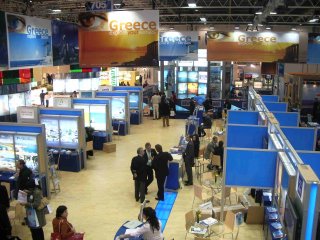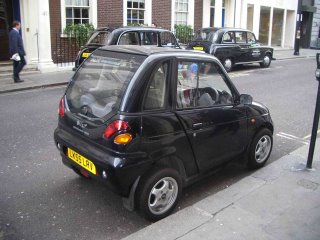Like last year, I visited it during the last day, and like last year it was again heavily sponsored  by the Greek National Tourist Organization. As far as PR work, unilateral agreements and marketing strategies go, I have to admit that in the past couple of years the ministry of tourism is doing quite well, although now are the years ahead of us that internal regulations and quality assurances have to be fulfilled. Unfortunately however, I cannot be equally positive about the greek stand in the exhibition; although in a strategic spot, and definitely one of the 20 best stands, it was overshadowed by the magnificent Spanish presentation, which was massive, multiple (not a unifying theme, but 3 or 4 distinct themes, stylish, informative and bustling with people. Innovation, flair, design and charisma were the elements missing from the greek stall, which thankfully cannot be said for the ‘explore your senses’ campaign itself, which is a thousand times better than last year’s distasteful ‘live your myth’.
by the Greek National Tourist Organization. As far as PR work, unilateral agreements and marketing strategies go, I have to admit that in the past couple of years the ministry of tourism is doing quite well, although now are the years ahead of us that internal regulations and quality assurances have to be fulfilled. Unfortunately however, I cannot be equally positive about the greek stand in the exhibition; although in a strategic spot, and definitely one of the 20 best stands, it was overshadowed by the magnificent Spanish presentation, which was massive, multiple (not a unifying theme, but 3 or 4 distinct themes, stylish, informative and bustling with people. Innovation, flair, design and charisma were the elements missing from the greek stall, which thankfully cannot be said for the ‘explore your senses’ campaign itself, which is a thousand times better than last year’s distasteful ‘live your myth’.
As far as the ‘green area’ goes (the IT and suppliers sector, which is the one more interesting for our business), it was good to see it refreshed and with many new entries, giving me some small hope for the 2007 contracts. All in all the exhibition did not seem to vary much from last year; of course I did not participate in any of the lectures or hall presentations to have an insight in those more interesting and interactive aspects of the show. However, since this was my 3rd time at the WTM (2nd in the Excel exhibition centre), I was able to appreciate it much more, as well as to recognize some of the trends of the travel industry. Take that in conjunction with my London-Athens interbrain debate and voila, what do you get? A point for interpreting the travel industry as the fundamental means of cultural exchange.
Surely enough most of us travel for leisure, to entertain  ourselves, to have fun, to ski or to tan, to visit museums and relax, but it is much more than that. More and more tourists complain about artificial paradises, sandy beaches created by damping cement on corals, super-packages that do not give any breathing space, all inclusive resorts, vacation deals that make no difference whether you visit the
ourselves, to have fun, to ski or to tan, to visit museums and relax, but it is much more than that. More and more tourists complain about artificial paradises, sandy beaches created by damping cement on corals, super-packages that do not give any breathing space, all inclusive resorts, vacation deals that make no difference whether you visit the
Where does culture come into play? Well, it is strikingly obvious that it is involved into almost everything. From the clean streets, to the battery recycling collection point, from people reading their newspaper on the bus, to the waitress giving you back the correct change, from the low charge ticket to an excellent service, the theatre shows, the architecture, the laws applied, people’s behavior and apparel, all these reflect a country’s culture and attitude towards not only it’s own people, but also to it’s guests. Simply enough, all the great buildings and monuments we take pictures of, are part and creations of a culture, whereas the natural environment, which has an opposite relation being one of the roots of culture, it’s preservation and management, speaks volumes of the cultural background of the people responsible for protecting it.
 For example, whereas in
For example, whereas in
To take that argument one step further, since all of the above are the creations of people, then the most interesting and most seen tourist attraction, especially in a city break destination, are the people living in the city themselves, the people constituting the city. The way they talk, they dress, how polite they are, their eating and drinking habits, the books and newspapers they read, the coffee they drink, the radio they listen to, the TV shows and films they watch, whether they are smelly or not, long haired or with a beard, or both, how fast they walk and to which direction, how cool or nerdy they look, all these are picked up by a destination’s visitor, they are commented upon and they are definitely impressed as part of a culture.
The bottom line is that well exercised traveling creativ ely highlights the differences between cultures and civilizations, but also produces infinite everyday bridges that enhance communication, understanding and respect. It becomes apparent then, that as the travel industry settles into it’s new dimensions (internet and terrorism being the main characteristics, while eco-responsibility looming in the near future), it will have to seriously address the directions it will follow in order to ensure that this cultural exchange does not degenerate into a hedonistic money exchange over ‘nice’ things to buy and see, but instead ensures a safe, trustworthy environment for travelers to choose a destination based on it’s uniqueness and cultural identity.
ely highlights the differences between cultures and civilizations, but also produces infinite everyday bridges that enhance communication, understanding and respect. It becomes apparent then, that as the travel industry settles into it’s new dimensions (internet and terrorism being the main characteristics, while eco-responsibility looming in the near future), it will have to seriously address the directions it will follow in order to ensure that this cultural exchange does not degenerate into a hedonistic money exchange over ‘nice’ things to buy and see, but instead ensures a safe, trustworthy environment for travelers to choose a destination based on it’s uniqueness and cultural identity.

No comments:
Post a Comment